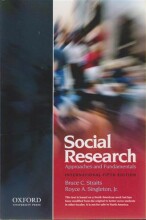Summary: Social Research : Approaches And Fundamentals. | 9780195394610 | Bruce C Straits, et al
- This + 400k other summaries
- A unique study and practice tool
- Never study anything twice again
- Get the grades you hope for
- 100% sure, 100% understanding
Read the summary and the most important questions on Social research : approaches and fundamentals. | 9780195394610 | Bruce C. Straits, Royce A. Singleton, Jr.
-
2 Hoofdstuk 2
This is a preview. There are 22 more flashcards available for chapter 2
Show more cards here -
explanation (in causal analysis)
an outcome in which, upon controlling for an antecedent test variable, the original bivariate relationship reduces to zero or near zero (defines a spurious relation) -
interpretation (in causal analysis)
an outcome in which the effect of the independent variable on the dependent variable is indirect through its effect on an intervening variable (mediator) that in turn influences the dependent; the mediator defines the interpretation -
3 Hoofdstuk 3
This is a preview. There are 41 more flashcards available for chapter 3
Show more cards here -
Stadia van social research
- Formuleren van het onderzoeksprobleem
- Voorbereiding van researchdoelen
- Meting
- Toetsen
- Gegevensinzameling
- Gegevensverwerking
- Gegevensanalyse en interpretatie
-
intervening variable/mediator
a variable that is intermediate between two other variables in a causal chain. -
4 Hoofdstuk 4
This is a preview. There are 33 more flashcards available for chapter 4
Show more cards here -
reactive measurement effect
an effect whereby the process of measurement itself, due to people’s awareness of being studied, produces changes in what is being measured. -
social desirability bias/effect
a tendency of some respondents to bias their answers in the direction of socially desirable traits or attitudes, thereby endeavoring to enhance their self-esteem or make a favorable impression on the interviewer or researcher. -
systematic measurement error
error from factors that systematically influence (bias) either the process of measurement or the concept being measured. Systematic errors are consistent across measurements taken at different times or are systematically related to characteristics of the cases being measured and thereby affect validity -
5 Hoofdstuk 5
This is a preview. There are 51 more flashcards available for chapter 5
Show more cards here -
probability proportionate to size sampling
a cluster sampling procedure that ensures that all individual cases have an equal chance of being selected by taking into account that clusters differ in size -
6 Hoofdstuk 6
This is a preview. There are 30 more flashcards available for chapter 6
Show more cards here -
experimenter expectancy effect
effect on subject’s behavior due to the experimenter’s expectations about how the experiment will turn out. -
external validity (in experiments)
the extent to which experimental findings are generalizable to other settings, subject populations, and time periods.
- Higher grades + faster learning
- Never study anything twice
- 100% sure, 100% understanding

































